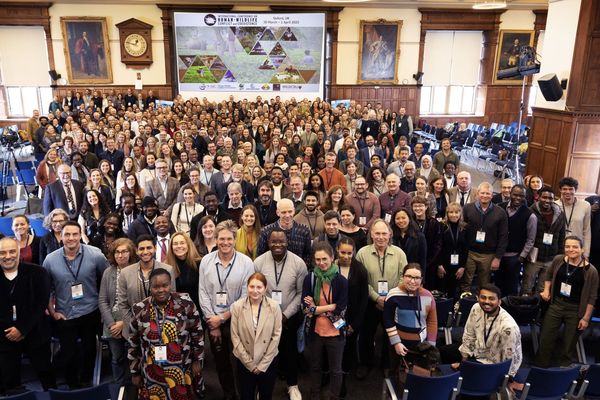Putting people at the heart of human-wildlife conflict: Outcomes of the International Conference on Human-Wildlife Conflict and Coexistence

irali Shukla, Environmental Peacebuilding Association, Deputy Chair of the CEESP Theme on Environment and Peace
Recently, the IUCN SSC Human-Wildlife Conflict & Coexistence Specialist Group and other partners co-hosted an International Conference on Human-Wildlife Conflict and Coexistence. Hundreds of delegates with a variety of backgrounds participated in sessions with the shared goals of: facilitating dialogue, generating interdisciplinary understandings of the most recent methodologies and ideas, and identifying and developing means of addressing gaps in effective human-wildlife conflict (HWC) management.
Recently, the IUCN Species Survival Commission (SSC) Human-Wildlife Conflict & Coexistence Specialist Group, the Global Environment Facility-funded and World Bank-led Global Wildlife Program, and the Wildlife Conservation Research Unit at Oxford University’s Department of Biology co-hosted an International Conference on Human-Wildlife Conflict and Coexistence. Hundreds of delegates with a variety of backgrounds participated in sessions with the shared goals of: facilitating dialogue, generating interdisciplinary understandings of the most recent methodologies and ideas, and identifying and developing means of addressing gaps in effective human-wildlife conflict (HWC) management.
The IUCN SSC guidelines of human-wildlife conflict and coexistence were launched on the first day of the conference and are now available for reading. These precede the development of a framework that will support progress on Target 4 of the recently adopted Kunming-Montreal Global Biodiversity Framework (GBF). In order to create robust engagement, policy, and capacity for efficient management, a working group will convene to discuss the future of HWC monitoring metrics. In several countries, various levels of impact-monitoring are already in place but assessing indirect challenges like opportunity and health costs have proven more difficult to assess.
There was consensus about the interdisciplinary nature of human-wildlife conflict and the need to put communities at the heart of this work. Lisa Farroway, Senior Environmental Specialist and Manager at the World Bank’s Global Wildlife Program acknowledged that “human-wildlife conflict is a development issue…oftentimes with catastrophic economic consequences.” While there is widespread recognition of the importance of traditional knowledge and Indigenous understandings, there seems to also be a need for more incorporation of these into projects and management plans. John Kamanga, Director of the South Rift Association of Land Owners, spoke about “decriminalizing communities” in the context of human wildlife conflict work. By doing so, we may be able to provide greater opportunities for coexistence.
The IUCN Species Survival Commission (SSC) Human-Wildlife Conflict & Coexistence Specialist Group is keen to collaborate across sectors and is currently seeking cooperation across their specialist groups, themes, and wider IUCN Commissions.

